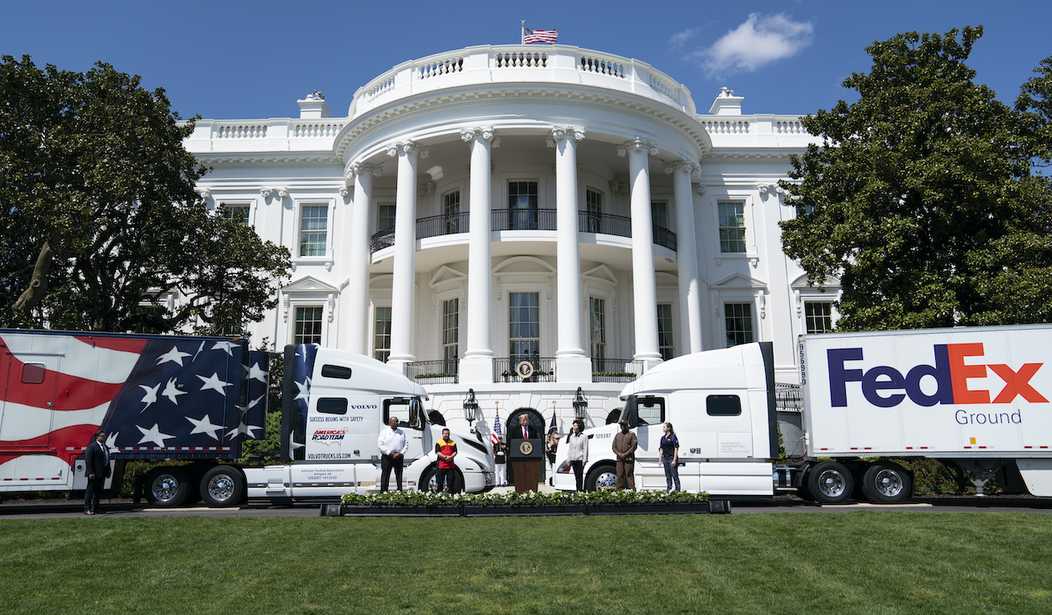Americans have adjusted their lifestyle to prevent the spread of the highly contagious COVID-19 outbreak by relying on online ordering and delivery services. The rapid growth in e-commerce required U.S. cargo carriers to transport an influx of essential and non-essential goods quickly and efficiently to customers. As this trend continues, our lawmakers must recognize the new challenges our cargo carriers face by removing regulations that no longer make sense for the industry.
U.S. cargo carriers are on the front lines of the coronavirus pandemic. Their service is invaluable to delivering medical supplies, like essential medication, PPE, COVID-19 tests, and household goods. But cargo carriers are also helping to deliver an increase of non-essential goods.
Since early March, when a majority of state governors closed all non-essential businesses, online sales increased by 25 percent in the United States. A majority of this increase is largely attributed to online sales of essential items like grocery sales. But non-essential online orders have spiked too. For example, e-commerce revenue exponentially increased in products associated with staying at home. According to Essential Retail, “Compared to March 2019, transaction volumes increased by 97% for home products and furnishings, 136% for DIY products, 163% for garden essentials, 26.6% for electronics.”
To fulfill the increase in online retail orders, American e-commerce businesses rely on freight delivery carriers like Amazon, UPS, FedEx, PODS, and several smaller regional shipping operations. The most common mode of transportation for shipping e-commerce cargo in the United States is freight trucks. Recent data shows that trucks transport over 70% of freight in the United States, which amounts to 11.49 billion tons of goods. This number is expected to increase with the uptick in online orders of essential and non-essential goods.
Recommended
U.S. cargo carriers have developed strong networks over decades to operate at a higher capacity, but there are other solutions to help with the influx of cargo shipments. One solution to quickly and cost-effectively increase our cargo carriers’ capacity would be to remove outdated regulations such as the rule that mandates tandem truck trailers can be no longer than 28 feet each in length.
With the increase in e-commerce items that ship in bulky boxes, but are relatively light, many trailers run out of physical room long before they reach their weight limits. Adding an additional five feet to each trailer (without increasing the permitted weight) would increase efficiency, leading to fewer trucks on the road, fewer miles driven, and potentially reduced costs for consumers who are depending on low-cost shipping for everyday household goods.
While these “twin-33” trailers are currently permitted in 20 states, the patchwork of rules hampers the nationwide logistics networks that deliver goods from warehouses in one state to consumers in another. If Congress enacted a national law allowing for a five-foot increase in trailers, shipping capacity would increase by over 18 percent per delivery, helping consumers during this crisis and aiding our economic recovery once it abates.
The regulation that dictates trailer length is decades old, long predating the explosion in e-commerce, so U.S. cargo carriers and delivery services are operating under rules from a different era, let alone rules that are responsive to the current crisis.
United States cargo carriers are subject to regulations that are intended to benefit consumers, the general public, and our economy. The uptick in online purchases directly impacts the U.S. cargo carriers transporting these goods. Thankfully, President Trump and Congress have recognized the important work that America’s cargo carriers and trucking companies are doing on the front lines of the coronavirus pandemic. Let’s hope our lawmakers continue to foster this essential industry, by removing unnecessary regulations to allow for Twin 33s.
Jesse Grady is a former staff member of President Donald J. Trump’s 2016 campaign and a former Regional Field Director for the Texas GOP.

























Join the conversation as a VIP Member